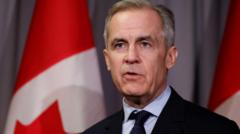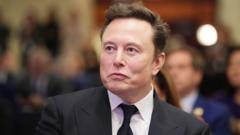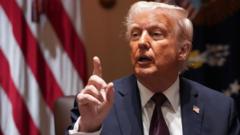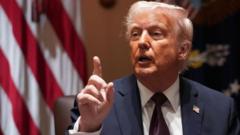Carney's remarks signal a shift in Canada-US relations, highlighting the challenges posed by US tariffs and the demand for a reimagined economic landscape.
### Canada PM Carney Declares New Era Amid Trade War with US

### Canada PM Carney Declares New Era Amid Trade War with US
Canadian Prime Minister Mark Carney emphasizes the need for a fresh economic strategy in response to US tariffs.
In a striking statement recently, Canadian Prime Minister Mark Carney announced that Canada’s traditional economic relationship with the United States has come to an end. Addressing reporters in Ottawa, he stressed the need for Canadians to "fundamentally reimagine our economy" as the country grapples with the repercussions of US President Donald Trump's tariffs. Carney's call marks a pivotal moment, urging for a strategy that could include retaliatory tariffs aimed at delivering "maximum impact" on the US economy.
On Wednesday, President Trump declared a permanent 25% tax on imported vehicles and parts as part of his broader protectionist agenda. This move has resulted in significant tensions, prompting Carney to announce that crucial trade agreements such as the Canada-US Automotive Products Agreement of 1965 are effectively nullified by these tariffs.
While he affirms Canada can sustain its auto industry despite these challenges, he also emphasized the necessity for reimagining and restructuring the nation's industry for greater independence. The government and business sectors will need to collaborate to adapt to this shifting landscape, including rethinking trade relationships with other countries.
Looking ahead to Canada’s upcoming general elections set for April 28, Carney has shifted his campaign plans to directly confront the implications of these tariffs. The US tariffs are significant, with an existing blanket duty of 25% on many Canadian goods and retaliation from Canada amounting to approximately C$60 billion ($42 billion) on US products.
Amidst this backdrop, Trump has cautioned against any alliances between Canada and the European Union in retaliation, threatening to escalate tariffs further if such collaboration occurs. Carney is expected to engage in a dialogue with Trump in the coming days, highlighting the importance of their communication.
As political parties in Canada respond to these trade tensions, Conservative leader Pierre Poilievre condemned the tariffs as "unjustified and unprovoked," while NDP leader Jagmeet Singh labeled it a "betrayal" from the US against its neighbor. Singh’s visit to auto workers in Windsor speaks to the immediate impact these tariffs could have on the Canadian workforce.
As Carney moves forward with plans to adapt Canada's economic approach, the broader implications of these trade disputes will be closely monitored, both in Canada and by global markets.
On Wednesday, President Trump declared a permanent 25% tax on imported vehicles and parts as part of his broader protectionist agenda. This move has resulted in significant tensions, prompting Carney to announce that crucial trade agreements such as the Canada-US Automotive Products Agreement of 1965 are effectively nullified by these tariffs.
While he affirms Canada can sustain its auto industry despite these challenges, he also emphasized the necessity for reimagining and restructuring the nation's industry for greater independence. The government and business sectors will need to collaborate to adapt to this shifting landscape, including rethinking trade relationships with other countries.
Looking ahead to Canada’s upcoming general elections set for April 28, Carney has shifted his campaign plans to directly confront the implications of these tariffs. The US tariffs are significant, with an existing blanket duty of 25% on many Canadian goods and retaliation from Canada amounting to approximately C$60 billion ($42 billion) on US products.
Amidst this backdrop, Trump has cautioned against any alliances between Canada and the European Union in retaliation, threatening to escalate tariffs further if such collaboration occurs. Carney is expected to engage in a dialogue with Trump in the coming days, highlighting the importance of their communication.
As political parties in Canada respond to these trade tensions, Conservative leader Pierre Poilievre condemned the tariffs as "unjustified and unprovoked," while NDP leader Jagmeet Singh labeled it a "betrayal" from the US against its neighbor. Singh’s visit to auto workers in Windsor speaks to the immediate impact these tariffs could have on the Canadian workforce.
As Carney moves forward with plans to adapt Canada's economic approach, the broader implications of these trade disputes will be closely monitored, both in Canada and by global markets.





















